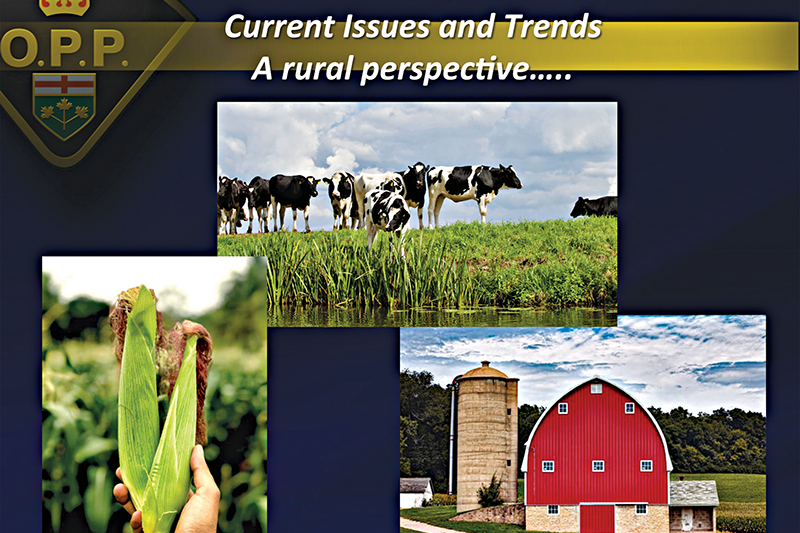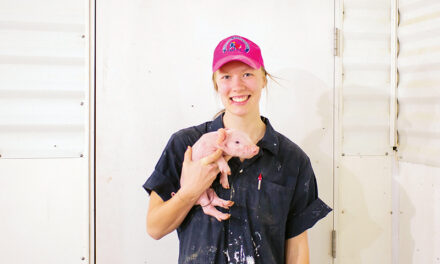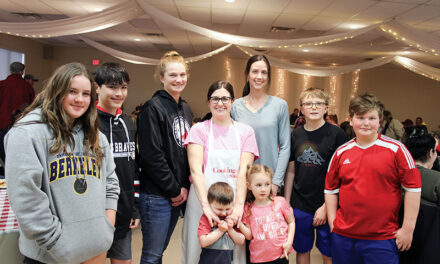A screenshot from the Mar. 4 Dundas Federation of Agriculture annual general meeting. Morin Photo
DUNDAS – The Dundas Federation of Agriculture (DFA) held their annual general meeting virtually on Wed., Mar. 4.
The group had an informative presentation from OPP Const. Jim Blanchette, community mobilization officer, for SD&G. The topic was rural issues and trends, animal welfare, security from trespassers (Bill 156) and road safety, and mental health.
Jackie Pemberton gave a presentation about what the Ontario Federation of Agriculture has been working on in the last year, and Ruth Vogel gave a members’ service report.
A new president and directors were elected.
Ryan Devries is the new president with past president Marty Derks taking on the role of vice president.
The directors are: Tom MacGregor, Jan Roosendaal, Dave Kerr, Stephen Mellon, Andy Corput, Warren Schneckenburger, Dave Pemberton and Tom Smyth. Retiring directors are Jim Shaw and Bernie Vander Zweep.
The OPP presentation covered aspects of Bill 156: Security from Trespass and Protecting Food Safety Act.
According to the presentation, “The act is aimed at curbing activism against farms and increasing fines for anyone caught trespassing on farmland and food processing plants. The act also introduces new measures against interfering with animal transportation and gaining access to a farm under ‘false pretenses’ (e.g. undercover filming/observation). The act is intended to: Eliminate or reduce the unique risks that are created when individuals trespass on those properties or interfere with farm animals, including the risk of exposing farm animals to disease and stress as well as the risk of introducing contaminants into the food supply.
Blanchette explained Bill 156 was designed to make situations better for everyone.
“It has been subject to a lot of criticism by activists and the intent was not to necessarily go against their right to protest,” he said.
“If you catch someone committing a trespass on your farm property and protected area, you do have the right to make arrests and you do have the right to use force, but I always want to caution people, it is generally not a good idea to do that and not only does it present a risk to you, the individual trying to affect the arrest, but it also sometime puts you in a rather difficult spot,” he said.
He said, often protesters are video taping any situation, and that makes calling the police instead of taking action yourself a better way to handle the situation.
He also pointed out that in this region there have been no instances of protesters creating an issue on farm property.
The number for police to call is: 1-888-310-1122.
He said that within the OPP is a group called the Provincial Liaison Team (PLT). Blanchette is a member of that team.
Its job is to work with groups to facilitate peaceful events and at the same time work with members of groups who may be on either side of a situation.
He said, “Our main goal is to make these events peaceful.”
A brief look at the act highlights what protesters cannot do.
- Protesters cannot: Breach the peace;
- Block or obstruct a highway;
- Cause a disturbance, take part in a riot;
- Wear a mask or disguise during an unlawful assembly, or, with intent to commit an indictable offence;
- Disobey a court order;
- Harm or injure anyone;
- Possess weapons of any kind including substances such as tear gas.
A link to the act is: www.ontario.ca/laws/statute/20s09?search=security+from+trespass.
“Most protesters are law-abiding and have strong feelings and strong beliefs and for the most part will do the right thing,” said Blanchette.
He said there are significant penalties when protesters do not follow the rules.
Under the Highway Safety Act he said a farm tractor is not a motor vehicle but is a vehicle. Implements of husbandry are also vehicles not motor vehicles or trailers and a farm wagon remains a farm wagon no matter what the towing vehicle is.
Blanchette talked about the Provincial Animal Welfare Services Act, (PAWS).
This Bill is called Bill 136 and replaces the Ontario Society for the Prevention of Cruelty to Animals Act and sets out Ontario’s new enforcement model.
Basic standards of care that apply to all animals covered under the act, include requirements for:
- adequate and appropriate food, water, medical attention and care;
- ventilation, light and protection from the elements, including harmful temperatures;
- sanitary conditions and space to enable natural movement and exercise;
- pens or enclosed structures;
- humane euthanasia to minimize pain and distress to animals;
- transportation in a manner that ensures an animal’s physical safety and general welfare.
Provincial inspectors follow a standard code of conduct and if they visit you on-site, they will: introduce themselves, explain why they are attending on-site, such as for an inspection or for an investigation and follow a standard code of conduct.

Joseph Morin is the Editor of the Eastern Ontario AgriNews, and the Record. He is, despite years of practice, determined to eventually play the guitar properly. He has served the Eastern Ontario community as a news editor, and journalist for the past 25 years with the Iroquois Chieftain, Kemptville Advance, West Carleton Review, and Ottawa Carleton Review in Manotick. He has never met a book he did not like.










